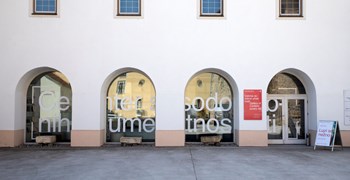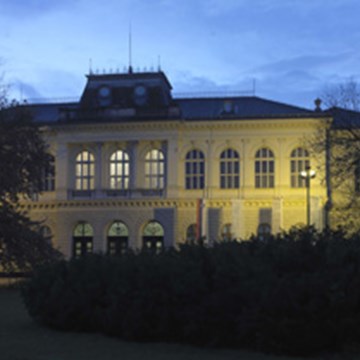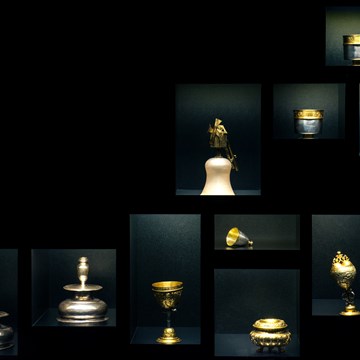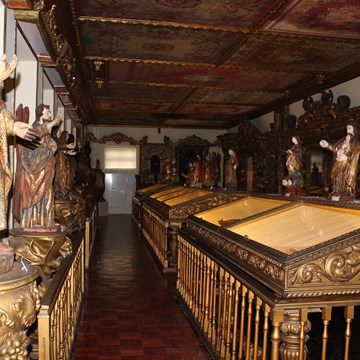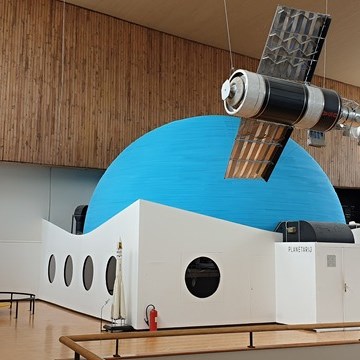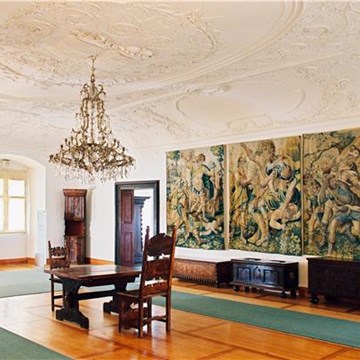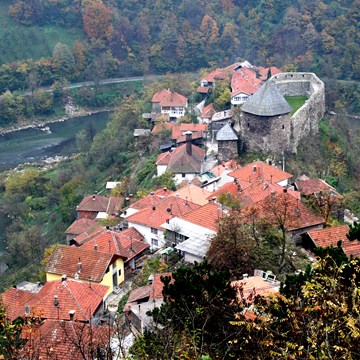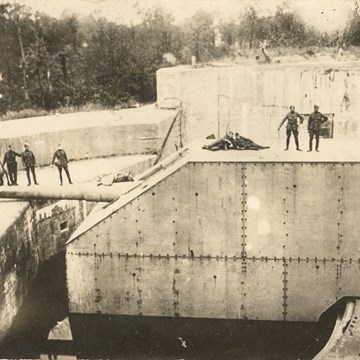SHAME ON YOU!
Libia Castro & Ólafur Ólafsson, Matej Čepin, Robert Hutinski, Staš Kleindeinst, Aino-Marjatta Mäki and Jaakko Karhunen, Luiza Margan, Paula Muhr, Pleurad Xhafa, Adrian Paci, Ana Pečar and Oliver Ressler, Ana Nedeljković and Nikola Majdak jr., Vahida Ramujkić (together with: Aviv Kruglanski, Dejan Došljak), Zgodovinski arhiv Celje (Historical Archive Celje)
Curator: Maja Hodošček
Locations: Gallery of Contemporary Art, Likovni salon and Chapel of St Elisabeth
26. 11. 2015 - 17. 1. 2016
Shame on you! is an interdisciplinary project spanning over four years, produced in concept and programme by the cultural institutions Celeia Institute – Centre for Contemporary Art in Celje (Slovenia) and the Miroslav Kraljević Gallery in Zagreb (Croatia).
The project functions as an artistic and theoretical platform, focused on analysing the affect of shame. As part of the project, and alongside the lectures and presentations, an art residency programme also took place in the period between 2013 and 2015. During their residencies, the invited artists produced the works that will be shown in the exhibition for the first time. Anna Dašović, Paula Muhr, Aina-Marjatta Mäki and Jaakko Karhunen, as well as Miloš Trakilović were hosted in Celje.
The starting hypothesis of the Shame on you! project is based on the assumption that feeling shame is a symptom that reveals various forms of social inequality since this is in its core a socially conditioned affect. In the process of coming up with the concept for the exhibition, we focused on the area of the economy and its division of labour as it is an essential producer of sociality (through work we enter into relationships and form a variety of social ties). It is worrying that in the contemporary times a singular form of economy is becoming established that is based on massive exploitation of the work force, which presents itself as the only possible social reality that should be adapted to. Theoreticians Julie Graham and Katherine Gibson write that it is precisely the naturalization of the economy, which has established itself in the public space to a totality after the demise of socialism, that has led to a shift from understanding the economy as a field of transformation, or at least as a field which can be communally managed, to exercising the latter as hegemonic formations of governing.[1] The governing of society from the standpoint of the interests of the economy, new production processes and changed forms of labour have a significant impact on social relations, creating new subjectivities and various social classes. As part of the project, we were predominantly interested in what type of working conditions, within situations where neo-liberalism appears as the fundamental discourse, the affect of shame occurs and the relations that it discloses.In doing so, we took into account the mentality of the neo-liberal ideology which spreads awareness that economic and social success depends on our own capacity for action on the labour market and that the individual is solely responsible for his own social status. Tomaž Flajs, Gestalt psychotherapist, stresses that shame is experienced by the individual in an intimate situation as something painful. This experience is inextricably linked with the external environment since by humiliating certain identities or ways of living, society establishes the mechanisms of control, thereby allowing the reproduction of socially acceptable norms.[2] Conformism is therefore essential for the maintenance of shame given that this affect appears as the individual or the community no longer has the ability or wish to adapt to the given norms of reality.
By establishing different relations to the concept of work in the present times, the works presented in the exhibition demonstrate that multiple diverse different identities are not able to adapt to the existing economic reality. The inability to achieve economic independence is experienced as personal guilt and shame.Such an intimate experiencing of one’s own inadequacy or failure significantly contributes to maintaining the system aimed at continuously exploiting the available resources in order to create surplus value. Through the artworks, the exhibition seeks to deconstruct the ideological idea which proposes that the social position in the economic division of labour taken up by the individual is his own fault. It draws attention to systemic violence that does not offer any, or else barely minimal, social security to the individual, yet demands increasingly more impossible ways of working, by which it has a fundamental impact on the reduction of the quality of life.
The works highlight precarity (Luiza Margan), which is, according to recent sociological research, becoming the most widespread present-day form of employment.[3] It is defined by a continuing state of uncertainty and is realized through the manifold forms of irregular working relations. Transnational capitalist action requires a global market and the countries that had in the past ensured at least the minimum social protection of the workforce due to national interests, have been abolishing this minimum security measure and are cooperating in spreading the neo-liberal discourse. The political decision-making system has completely distanced itself from citizens and is taking place separately, independently of the needs and will of the community (Matej Čepin).
The works in the exhibition address the increase of labour migrations (Adrian Paci) and link the exploitation of the labour of the global south to the historical phenomena of state racism, which is still exercised today through invisible mechanisms (Robert Hutinski).
They deal with the consequences of privatizations in rural areas (Vahida Ramujkić, in collaboration with Aviv Kruglanski and Dejan Došljak) and point to the proliferation of the so-called “working poor” (Pleurad Xhafa) in which workers do not earn enough to survive in their paid employment. They expose deviant practices (goodbye letter kept by the Historical Archives Celje) and activist situations that oppose the profitable mode of governing society (Ana Pečar and Oliver Ressler). They disclose capitalist strategies that are used to try and influence political decisions (Libia Castro and Ólafur Olafsson) and cast a doubt in democracy as a form of governance (Ana Nedeljković and Nikola Majdak jr., Staš Kleindeinst).
They wonder what kind of subjectivities are produced by capitalism (Aino-Marjatta Mäki and Jaakko Karhunen) and look for connections between the demands of the economy and an increase in all kinds of mental illness (Paula Muhr).
But they also offer different ways of thinking and living, such as the proposal to step out of the system of labour and into life (Dalibor Bori Zupančič).
--------------------------------------------------------------------------------
[1] J.K. Gibson-Graham, A Postcapitalist Politics, p. 54
[2] Tomaž Flajs, Sram: Med intimo in družbo [Shame: Between Intimacy and Society], lecture, Likovni salon (2 April 2015)
[3]Vassilis S. Tsianos and Dimitris Papadopoulos: DIWY! Precarity in Embodied Capitalism
Exhibitions and events

JUDIT FLÓRA SCHULLER: Mame na Himalaji
Temporary exhibition at Center for Contemporary Arts Celje until 31.08.2025Lepo vabljeni na odprtje razstave v petek, 6. junija, ob 19. uri v Likovni salon. Umetniška praksa Judit Schuller je prepletena z njenim življenjem. Obravnava osebne, izrazito intimne, teme in se še...

6. Triennial of Young Artists - PREMIERE 2025
Temporary exhibition at Center for Contemporary Arts Celje until 28.09.2025Fields of intimacy, transitions and potentials of the medium Tinkara Babić, Bad Artist & Iva Suhadolnik Gregorin, Lučka Centa, Jurij Hartman, Ana Janež, Žoel Kastelic, Rene Ketiš, Anja Kočar,...
Activities from this museum
We don't have anything to show you here.
